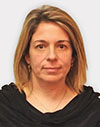 Maria Kokkori is a research fellow at the Art Institute of Chicago and a Lecturer in the Department of Art History at the University of Chicago. She received her PhD in Object-Based Art History in 2008 from the Courtauld Institute of Art in London, following advanced degrees in painting conservation and the science of materials. Her thesis focused on the examination of paintings by Kazimir Malevich, Ivan Kliun and Liubov Popova. She completed a postdoctoral fellowship at the Courtauld Institute with a focus on Russian Constructivism, and in 2009-2011 she was a research fellow of the Malevich Society. Maria Kokkori works on early twentieth-century European art, with a special interest in Russian modernism, the materiality of art, and the intersections of art, science and technology. Her research and teaching focus on artists’ materials and techniques, the characterisation of visual and material changes, the application of new methods for object-based studies, material properties and technologies, colour theories, and artists as producers. Her research has been supported by the Courtauld Institute of Art, the Getty Research Institute, and the Malevich Society. Her recent publications include Utopia: Russian art and Culture 1900-1989 (2013, author and co-editor), she is currently working on a book about Kazimir Malevich and the Unovis group.
Maria Kokkori is a research fellow at the Art Institute of Chicago and a Lecturer in the Department of Art History at the University of Chicago. She received her PhD in Object-Based Art History in 2008 from the Courtauld Institute of Art in London, following advanced degrees in painting conservation and the science of materials. Her thesis focused on the examination of paintings by Kazimir Malevich, Ivan Kliun and Liubov Popova. She completed a postdoctoral fellowship at the Courtauld Institute with a focus on Russian Constructivism, and in 2009-2011 she was a research fellow of the Malevich Society. Maria Kokkori works on early twentieth-century European art, with a special interest in Russian modernism, the materiality of art, and the intersections of art, science and technology. Her research and teaching focus on artists’ materials and techniques, the characterisation of visual and material changes, the application of new methods for object-based studies, material properties and technologies, colour theories, and artists as producers. Her research has been supported by the Courtauld Institute of Art, the Getty Research Institute, and the Malevich Society. Her recent publications include Utopia: Russian art and Culture 1900-1989 (2013, author and co-editor), she is currently working on a book about Kazimir Malevich and the Unovis group.
Maria Kokkori is a research fellow at the Art Institute of Chicago and a Lecturer in the Department of Art History at the University of Chicago. She received her PhD in Object-Based Art History in 2008 from the Courtauld Institute of Art in London, following advanced degrees in painting conservation and the science of materials. Her thesis focused on the examination of paintings by Kazimir Malevich, Ivan Kliun and Liubov Popova. She completed a postdoctoral fellowship at the Courtauld Institute with a focus on Russian Constructivism, and in 2009-2011 she was a research fellow of the Malevich Society. Maria Kokkori works on early twentieth-century European art, with a special interest in Russian modernism, the materiality of art, and the intersections of art, science and technology. Her research and teaching focus on artists’ materials and techniques, the characterisation of visual and material changes, the application of new methods for object-based studies, material properties and technologies, colour theories, and artists as producers. Her research has been supported by the Courtauld Institute of Art, the Getty Research Institute, and the Malevich Society. Her recent publications include Utopia: Russian art and Culture 1900-1989 (2013, author and co-editor), she is currently working on a book about Kazimir Malevich and the Unovis group.


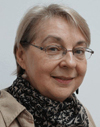 Christina Lodder is an Honorary Professor of the History of Art at the University of Kent and co-editor of Brill’s Russian History and Culture series. Her numerous publications on Russian art of the early twentieth century include articles, books and translations, most notably Russian Constructivism (1983); Constructing Modernity: The Art and Career of Naum Gabo (co-author with Martin Hammer, 2000); Gabo on Gabo (co-editor with Martin Hammer, 2000); Constructive Strands in Russian Art (2005); Rethinking Malevich (co-editor with Charlotte Douglas, 2007); Utopian Reality: Reconstructing Culture in Revolutionary Russia and Beyond (co-editor with Maria Kokkori and Maria Mileeva, 2013); a translation and introduction to Aleksei Gan’s Constructivism (2013); and Celebrating Suprematism (2018), see
Christina Lodder is an Honorary Professor of the History of Art at the University of Kent and co-editor of Brill’s Russian History and Culture series. Her numerous publications on Russian art of the early twentieth century include articles, books and translations, most notably Russian Constructivism (1983); Constructing Modernity: The Art and Career of Naum Gabo (co-author with Martin Hammer, 2000); Gabo on Gabo (co-editor with Martin Hammer, 2000); Constructive Strands in Russian Art (2005); Rethinking Malevich (co-editor with Charlotte Douglas, 2007); Utopian Reality: Reconstructing Culture in Revolutionary Russia and Beyond (co-editor with Maria Kokkori and Maria Mileeva, 2013); a translation and introduction to Aleksei Gan’s Constructivism (2013); and Celebrating Suprematism (2018), see 
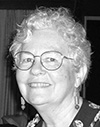 Charlotte Douglas is the Founding President of the Malevich Society. An art historian specializing in the Russian Avant-Garde, most particularly Kazimir Malevich. A list of her numerous publications, many of which may be read and downloaded, are available on her
Charlotte Douglas is the Founding President of the Malevich Society. An art historian specializing in the Russian Avant-Garde, most particularly Kazimir Malevich. A list of her numerous publications, many of which may be read and downloaded, are available on her 
 Maria Kokkori is a research fellow at the Art Institute of Chicago and a Lecturer in the Department of Art History at the University of Chicago. She received her PhD in Object-Based Art History in 2008 from the Courtauld Institute of Art in London, following advanced degrees in painting conservation and the science of materials. Her thesis focused on the examination of paintings by Kazimir Malevich, Ivan Kliun and Liubov Popova. She completed a postdoctoral fellowship at the Courtauld Institute with a focus on Russian Constructivism, and in 2009-2011 she was a research fellow of the Malevich Society. Maria Kokkori works on early twentieth-century European art, with a special interest in Russian modernism, the materiality of art, and the intersections of art, science and technology. Her research and teaching focus on artists’ materials and techniques, the characterisation of visual and material changes, the application of new methods for object-based studies, material properties and technologies, colour theories, and artists as producers. Her research has been supported by the Courtauld Institute of Art, the Getty Research Institute, and the Malevich Society. Her recent publications include Utopia: Russian art and Culture 1900-1989 (2013, author and co-editor), she is currently working on a book about Kazimir Malevich and the Unovis group.
Maria Kokkori is a research fellow at the Art Institute of Chicago and a Lecturer in the Department of Art History at the University of Chicago. She received her PhD in Object-Based Art History in 2008 from the Courtauld Institute of Art in London, following advanced degrees in painting conservation and the science of materials. Her thesis focused on the examination of paintings by Kazimir Malevich, Ivan Kliun and Liubov Popova. She completed a postdoctoral fellowship at the Courtauld Institute with a focus on Russian Constructivism, and in 2009-2011 she was a research fellow of the Malevich Society. Maria Kokkori works on early twentieth-century European art, with a special interest in Russian modernism, the materiality of art, and the intersections of art, science and technology. Her research and teaching focus on artists’ materials and techniques, the characterisation of visual and material changes, the application of new methods for object-based studies, material properties and technologies, colour theories, and artists as producers. Her research has been supported by the Courtauld Institute of Art, the Getty Research Institute, and the Malevich Society. Her recent publications include Utopia: Russian art and Culture 1900-1989 (2013, author and co-editor), she is currently working on a book about Kazimir Malevich and the Unovis group. 
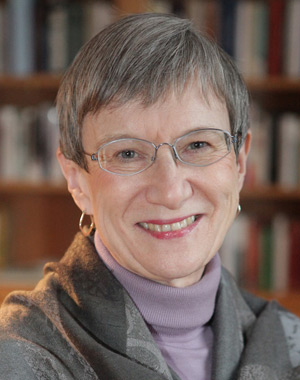 Linda Henderson has taught twentieth-century European and American art at the University of Texas since 1978. Professor Henderson’s research and teaching focus on the interdisciplinary study of modernism, including the relation of modern art to fields such as geometry, science and technology, and mystical and occult philosophies. In addition to periodical articles and catalog essays, she is the author of The Fourth Dimension and Non-Euclidean Geometry in Modern Art (Princeton University Press, 1983; new ed., MIT Press, 2009), a book that has had a great impact on Malevich studies worldwide. She is also the author of Duchamp in Context: Science and Technology in the Large Glass and Related Works (Princeton, 1998), and the co-editor of From Energy to Information: Representation in Science, and Technology, Art and Literature (Stanford University Press, 2002). A Guggenheim Fellow in 1988-89, Professor Henderson holds the David Burton, Jr. Centennial Professorship in Art History.
Linda Henderson has taught twentieth-century European and American art at the University of Texas since 1978. Professor Henderson’s research and teaching focus on the interdisciplinary study of modernism, including the relation of modern art to fields such as geometry, science and technology, and mystical and occult philosophies. In addition to periodical articles and catalog essays, she is the author of The Fourth Dimension and Non-Euclidean Geometry in Modern Art (Princeton University Press, 1983; new ed., MIT Press, 2009), a book that has had a great impact on Malevich studies worldwide. She is also the author of Duchamp in Context: Science and Technology in the Large Glass and Related Works (Princeton, 1998), and the co-editor of From Energy to Information: Representation in Science, and Technology, Art and Literature (Stanford University Press, 2002). A Guggenheim Fellow in 1988-89, Professor Henderson holds the David Burton, Jr. Centennial Professorship in Art History.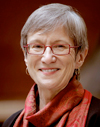 Linda Dalrymple Henderson is the David Bruton, Jr. Centennial Professor in Art History and Distinguished Teaching Professor at the University of Texas at Austin. In addition to numerous essays, she is the author of The Fourth Dimension and Non-Euclidean Geometry in Modern Art (Princeton University Press, 1983; new ed., MIT Press, 2013), of which a chapter is devoted to Malevich. She is also the author of Duchamp in Context: Science and Technology in the Large Glass and Related Works (Princeton, 1998), and the co-editor of From Energy to Information: Representation in Science, and Technology, Art and Literature (Stanford University Press, 2002). A Guggenheim Fellow in 1988-89, she has most recently held fellowships at the American Academy in Berlin (2014) and the Institut National d’Histoire de l’Art, Paris (2016). She is currently working on a book project entitled “The Energies of Modernism: Art, Science, and Occultism in the Early Twentieth Century,” which includes a chapter on Malevich and the Russian avant-garde.
Linda Dalrymple Henderson is the David Bruton, Jr. Centennial Professor in Art History and Distinguished Teaching Professor at the University of Texas at Austin. In addition to numerous essays, she is the author of The Fourth Dimension and Non-Euclidean Geometry in Modern Art (Princeton University Press, 1983; new ed., MIT Press, 2013), of which a chapter is devoted to Malevich. She is also the author of Duchamp in Context: Science and Technology in the Large Glass and Related Works (Princeton, 1998), and the co-editor of From Energy to Information: Representation in Science, and Technology, Art and Literature (Stanford University Press, 2002). A Guggenheim Fellow in 1988-89, she has most recently held fellowships at the American Academy in Berlin (2014) and the Institut National d’Histoire de l’Art, Paris (2016). She is currently working on a book project entitled “The Energies of Modernism: Art, Science, and Occultism in the Early Twentieth Century,” which includes a chapter on Malevich and the Russian avant-garde.
 Wendy Salmond is professor of art history in the Department of Art at Chapman University, Orange, California. She is English editor of Kazimir Malevich. Letters, Documents, Memoirs, Criticism, 2 vols, compiled and edited by Irina Vakar and Tatiana Mikhienko (Tate Publishing, 2015) and of Kazimir Malevich. Kyiv Years 1928-1930, compiled and edited by Tetyana Filevska (Rodovid Press, 2017). Her publications include Arts and Crafts in Late Imperial Russia: Reviving the Kustar Art Industries; Treasures into Tractors: The Selling of Russia’s Cultural Heritage, 1918-1938 (co-edited with Anne Odom); and Konstantin Makovsky: The Tsar’s Painter in America and Paris. Her current project is a book on Russian icons in America.
Wendy Salmond is professor of art history in the Department of Art at Chapman University, Orange, California. She is English editor of Kazimir Malevich. Letters, Documents, Memoirs, Criticism, 2 vols, compiled and edited by Irina Vakar and Tatiana Mikhienko (Tate Publishing, 2015) and of Kazimir Malevich. Kyiv Years 1928-1930, compiled and edited by Tetyana Filevska (Rodovid Press, 2017). Her publications include Arts and Crafts in Late Imperial Russia: Reviving the Kustar Art Industries; Treasures into Tractors: The Selling of Russia’s Cultural Heritage, 1918-1938 (co-edited with Anne Odom); and Konstantin Makovsky: The Tsar’s Painter in America and Paris. Her current project is a book on Russian icons in America.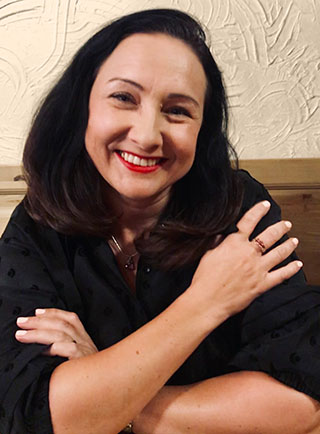 Natalia Murray was born and educated in St Petersburg where she received her BA and MA in art history, before gaining her PhD from the Courtauld Institute of Art, London.
At present, she works as an independent curator and an associate lecturer at the Courtauld Institute of Art. She has curated Revolution. Russian Art. 1917-1932 at the Royal Academy of Arts in London (2017) and The World as Objectlessness. The Birth of a New Art which traces development of the new art in Vitebsk from Chagall to Malevich, at the Yeltsin Centre in Yekaterinburg (October 2021).
Her books include Two Women Patrons of the Russian Avant-Garde. Nadezhda Dobychina and Klavdia Mikhailova (Unicorn, 2021); Art for the Workers. Proletarian Art and Festive Decorations of Petrograd. 1917-1920 (Brill, 2018); and The Unsung Hero of the Russian Avant-Garde. The Life and Times of Nikolay Punin (Brill, 2012), published in a Russian translation (‘Slovo’, 2018).
Natalia Murray was born and educated in St Petersburg where she received her BA and MA in art history, before gaining her PhD from the Courtauld Institute of Art, London.
At present, she works as an independent curator and an associate lecturer at the Courtauld Institute of Art. She has curated Revolution. Russian Art. 1917-1932 at the Royal Academy of Arts in London (2017) and The World as Objectlessness. The Birth of a New Art which traces development of the new art in Vitebsk from Chagall to Malevich, at the Yeltsin Centre in Yekaterinburg (October 2021).
Her books include Two Women Patrons of the Russian Avant-Garde. Nadezhda Dobychina and Klavdia Mikhailova (Unicorn, 2021); Art for the Workers. Proletarian Art and Festive Decorations of Petrograd. 1917-1920 (Brill, 2018); and The Unsung Hero of the Russian Avant-Garde. The Life and Times of Nikolay Punin (Brill, 2012), published in a Russian translation (‘Slovo’, 2018).